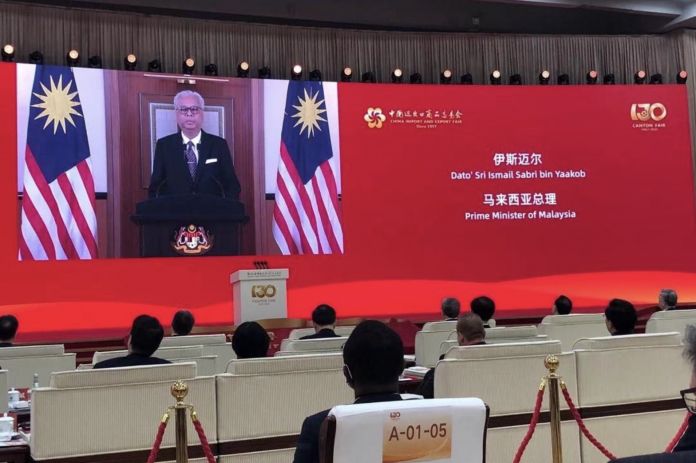KUALA LUMPUR, Oct 14 — The digital economy, the Fourth Industrial Revolution (4IR), and the adoption of sustainable development are “domains with untapped economic potentials” in the bilateral trade between Malaysia and China, said Prime Minister Datuk Seri Ismail Sabri Yaakob.
He said these three areas have untapped potential although investments and bilateral trade between the two nations have been growing steadily since 2009, whereby China has continued to be Malaysia’s largest trading partner, accounting for 18.6 per cent of total trade in 2020.
The Prime Minister said this in delivering his opening address virtually at the 130th China Import and Export Fair (Canton Fair) opening ceremony here today.
Touching on the digital economy, Ismail Sabri said Malaysia had launched the MyDIGITAL initiative early this year to further accelerate the country’s digital transformation.
Targeting to attract US$17.32 billion (US$1= RM4.15) in both international and domestic digital investments, the MyDIGITAL initiative would be implemented through the Malaysia Digital Economy Blueprint that plans to escalate the country’s progress as a technologically advanced economy by 2030, he added.
On 4IR, Ismail Sabri said as Malaysia has embarked on its journey towards greater digitalisation, more efforts would be implemented, such as leveraging on the synergy of both the physical and digital worlds to elevate Malaysia’s competitiveness.
“For this reason, we have launched the 4IR, which was built upon a whole-of-nation approach through people-private-public partnerships,” the premier said. “This includes developing 4IR-enabling infrastructures for wider application of technological use while adopting an agile regulatory approach, all of those are aimed at meeting the needs of the businesses in the digital economy, as well as accelerating innovation and adaptation in technology.”
On the adoption of sustainable development, Ismail Sabri said under the recently tabled 12th Malaysia Plan (12MP), the “sustainability of energy resources has been identified as one of the key factors in the economic empowerment dimension.”
“Among others, this dimension includes the people-centric economy, green technology, renewable energy, and the mitigation of climate change,” he added.
Ismail Sabri noted that “such areas had already been the cornerstone of China’s trade and economic policies for many years, and they had been embodied in the Belt and Road Initiative (BRI) and China’s 14th Five-Year Plan.”
“Malaysia, being one of the first countries to support the BRI, wishes to reaffirm our confidence that this strategic and forward-looking initiative will open up more frontiers of connectivity.
“We have a firm belief that this mutual understanding will create new possibilities for growth and development across the Asia Pacific, Africa, as well as Central and Eastern Europe,” he said.
Last year, Malaysia’s exports to China expanded 11.1 per cent to US$37.77 billion, and China was also Malaysia’s biggest import source, accounting for 21.5 per cent of total imports.
“Similarly in the investment sphere, China has become Malaysia’s top investor, with investments amounting to US$4.41 billion last year, and this ranking has been maintained for the past five years since 2016,” the premier noted.
He also revealed that that 71 manufacturing projects from China were approved in 2020, with an expected generation of more than 10,000 jobs in Malaysia.
















